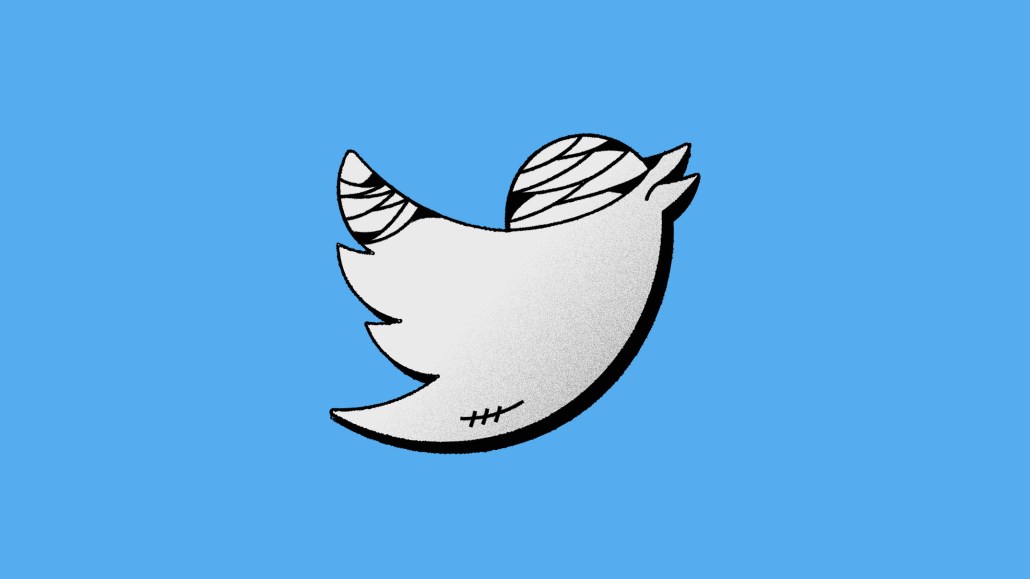Secure your place at the Digiday Publishing Summit in Vail, March 23-25
X marks the spot, but what does that spot signify, ask media agency execs

Twitter’s out-of-the-blue rebrand to X over the weekend caught the world by surprise — and yet few agencies were surprised at all that Twitter’s owner Elon Musk would make what appeared to be a rash, spur-of-the-moment move.
“Anybody who’s been following his takeover of Twitter could probably have predicted this, and he’s signaled this for a while,” said Amy Luca, evp and head of social at S4/Media.Monks.
Speculation on the reasoning behind the move seemed clear across the board: Meta’s Threads stole the spotlight from Musk and Twitter — and he wrenched it right back onto himself and his new company. Never mind the unforeseen consequences of his actions, from discarding decades of brand equity to the fact that Twitter’s headquarters still has the Twitter name on it.
“Think about all the small businesses that have been using the logo — the cost implications of actually changing a brand that drastically and that quickly has a ripple effect that is huge,” Luca told Digiday. “It’s not as simple — just because [Musk] he changed it on Twitter’s website or app, it doesn’t just automatically update everywhere. So I think there’s some obvious big brand implications.”
Musk certainly has developed some detractors in the agency and marketing worlds since his takeover of Twitter, including Ben Jeffries, CEO of Influencer, who registered deep dissatisfaction with some of Twitter’s moves. “The Twitter rebrand is Musk’s last attempt at saving a sinking ship, but it won’t work. Too little, too late and changing its name won’t help,” said Jeffries.
This appears, to some observers, as just another flashpoint in the ego battle between Musk and Meta’s CEO Mark Zuckerberg.
“The balance of risks and rewards in Twitter’s decision to rebrand is tipped heavily towards the former rather than the latter,” said Ed East, CEO of influencer agency Billion Dollar Boy (which aptly describes the principals involved here). East pointed to decisions Musk has made under his ownership that could make a rebrand critical, including bringing back banned accounts and relaxing content moderation policies.
“Within this context, it does make sense for Twitter to re-brand in a move akin to Meta’s, which has arguably been successful in allowing the organization to disassociate itself from negative public sentiment towards Facebook,” East said.
Another analyst pointed out that in the grand scheme of media, it just doesn’t matter that much — not when its up against a sophisticated (if equally disliked) media machine like Meta. “Twitter’s never been more than a footnote on their media plan because Twitter’s reach and growth trajectory aren’t notable, the targeting and personalization is nascent, and advertisers haven’t seen great performance with their lower funnel advertising,” noted Kelsey Chickering, principal analyst at Forrester’s CMO Practice.
Not everyone sees failure in Musk’s still-murky vision. Ross Clugston, chief creative officer at WPP’s Design Bridge and Partners, is one of the rare executives who believes the rebrand gives Musk and CEO Linda Yaccarino the ability to redo it all.
“It’s always been pretty obvious that Musk didn’t acquire Twitter to keep it as is,” said Clugston. “If you look at any of his acquisitions or businesses they always have a clear, single minded purpose. Twitter never has. The step away from all the baggage, political and otherwise also makes sense. His bets are usually highly calculated and contrary to the media’s assumptions.”
More in Media Buying

Omnicom Media North America CEO Ralph Pardo on integration and disintermediation
Ralph Pardo, CEO of Omnicom Media North America, explained how far along the holding company is in absorbing IPG’s agency brands, as well as why they were kept alive.

Ad Tech Briefing: Criteo named first ad tech partner to OpenAI’s ChatGPT ad pilot
This Ad Tech Briefing covers the latest in ad tech and platforms for Digiday+ members and is distributed over email every Tuesday at 10 a.m. ET. More from the series → Earlier this week, Criteo confirmed it is the first ad tech partner to integrate with OpenAI’s advertising pilot in the U.S., available in ChatGPT’s […]

The agency holdcos have an AI story, but not an AI business model
The holdco platforms need to deliver on the promises made — and so far, clients aren’t seeing it.







